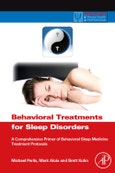Sleep is a major component of good mental and physical health, yet over 40 million Americans suffer from sleep disorders. Edited by three prominent clinical experts, Behavioral Treatments for Sleep Disorders is the first reference to cover all of the most common disorders (insomnia, sleep apnea, restless legs syndrome, narcolepsy, parasomnias, etc) and the applicable therapeutic techniques. The volume adopts a highly streamlined and practical approach to make the tools of the trade from behavioral sleep medicine accessible to mainstream psychologists as well as sleep disorder specialists. Organized by therapeutic technique, each chapter discusses the various sleep disorders to which the therapy is relevant, an overall rationale for the intervention, step-by-step instructions for how to implement the technique, possible modifications, the supporting evidence base, and further recommended readings. Treatments for both the adult and child patient populations are covered, and each chapter is authored by an expert in the field.
- Offers more coverage than any volume on the market, with discussion of virtually all sleep disorders and numerous treatment types
- Addresses treatment concerns for both adult and pediatric population
- Outstanding scholarship, with each chapter written by an expert in the topic area
- Each chapter offers step-by-step description of procedures and covers the evidence-based data behind those procedures
Please Note: This is an On Demand product, delivery may take up to 11 working days after payment has been received.
Table of Contents
Part I. BSM Treatment Protocols for Insomia 1. Sleep Restriction Therapy 2. Stimulus Control Therapy 3. Sleep Hygiene 4. Relaxation for Insomnia 5. Sleep Compression 6. Paradoxical Intention Therapy 7. Behavioral Experiments 8. Intervention to Reduce Unhelpful Beliefs about Sleep 9. Intervention to Reduce Misperception 10. Intervention to Reduce Use of Safety Behaviors 11. Cognitive Therapy for Dysfunctional Beliefs about Sleep and Insomnia 12. Cognitive Restructuring: Cognitive Therapy for Catastrophic Sleep Beliefs 13. Intensive Sleep Retraining: Conditioning Treatment for Primary Insomnia 14. Mindfulness-Based Therapy for Insomnia 15. Brief Behavioral Treatment of Insomnia 16. Using Bright Light and Melatonin to Reduce Jet Lag 17. Using Bright Light and Melatonin to Adjust to Night Work
Part II. BSM Protocols for Adherence and Treatment of Intrinsic Sleep Disorders 18. Motivational Enhancement Therapy 19. Exposure Therapy for Claustrophobic Reactions to Continuous Positive Airway Pressure 20. Sleep Apnea Self-Management Program 21. Cognitive Behavioral Therapy to Increase Adherence to Continuous Positive Airway 22. Cognitive Behavioral Therapy to Increase Adherence to Continuous Positive Airway 23. The Avoidance of the Supine Posture during Sleep for Patients with Supine-related Sleep Apnea 24. Scheduled Sleep Periods as an Adjuvant Treatment for Narcolepsy
Part III. BSM Protocols for Pediatric Sleep Disorders 25. Brief Parent Consultation to Prevent Infant/Toddler Sleep Disturbance 26. Unmodified Extinction for Childhood Sleep Disturbance 27. Graduated Extinction: Behavioral Treatment for Bedtime Problems and Night Wakings in Young Children 28. Extinction with Parental Presence 29. Bedtime Fading with Response Cost for Children with Multiple Sleep Problems 30. The Bedtime Pass 31. The Excuse-Me Drill: A Behavioral protocol to Promote Independent Sleep Initiation Skills and Reduce Bedtime Problems in Young Children 32. Day Correction of Pediatric Bedtime Problems 33. Graduated Exposure Games to Reduce Children's Fear of the Dark 34. Scheduled Awakenings: A Behavioral Protocol for Treating Sleepwalking and Sleep Terrors in Children 35. Imagery Rehearsal Therapy for Adolescents 36. Moisture Alarm Therapy for Primary Nocturnal Enuresis 37. Promoting Positive Airway Pressure Adherence in Children Using Escape Extinction within a Multi-Component Behavior Therapy Approach 38. Using Motivational Interviewing to Facilitate Healthier Sleep-Related Behaviors in Adolescents








